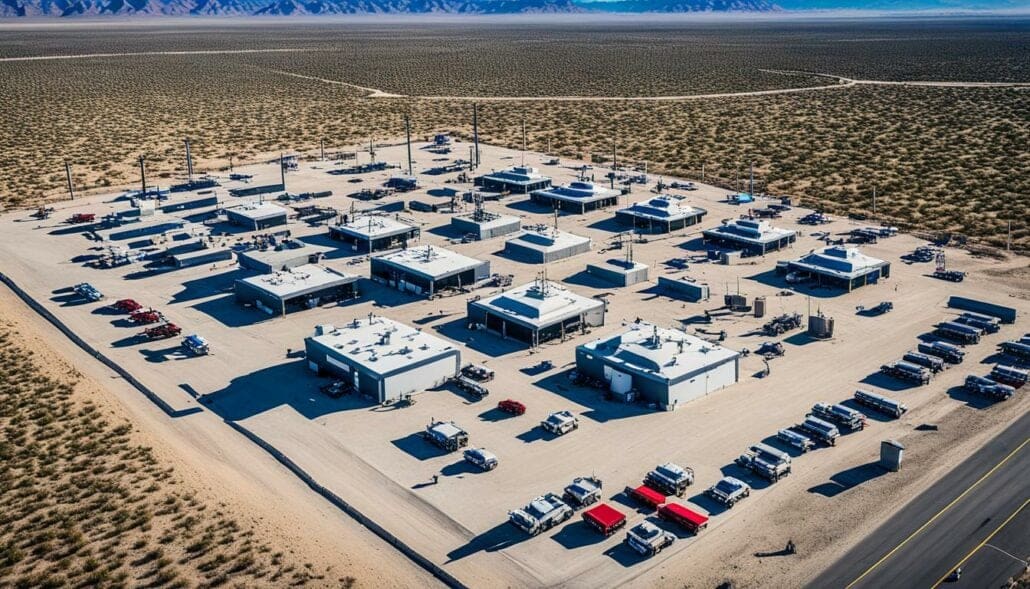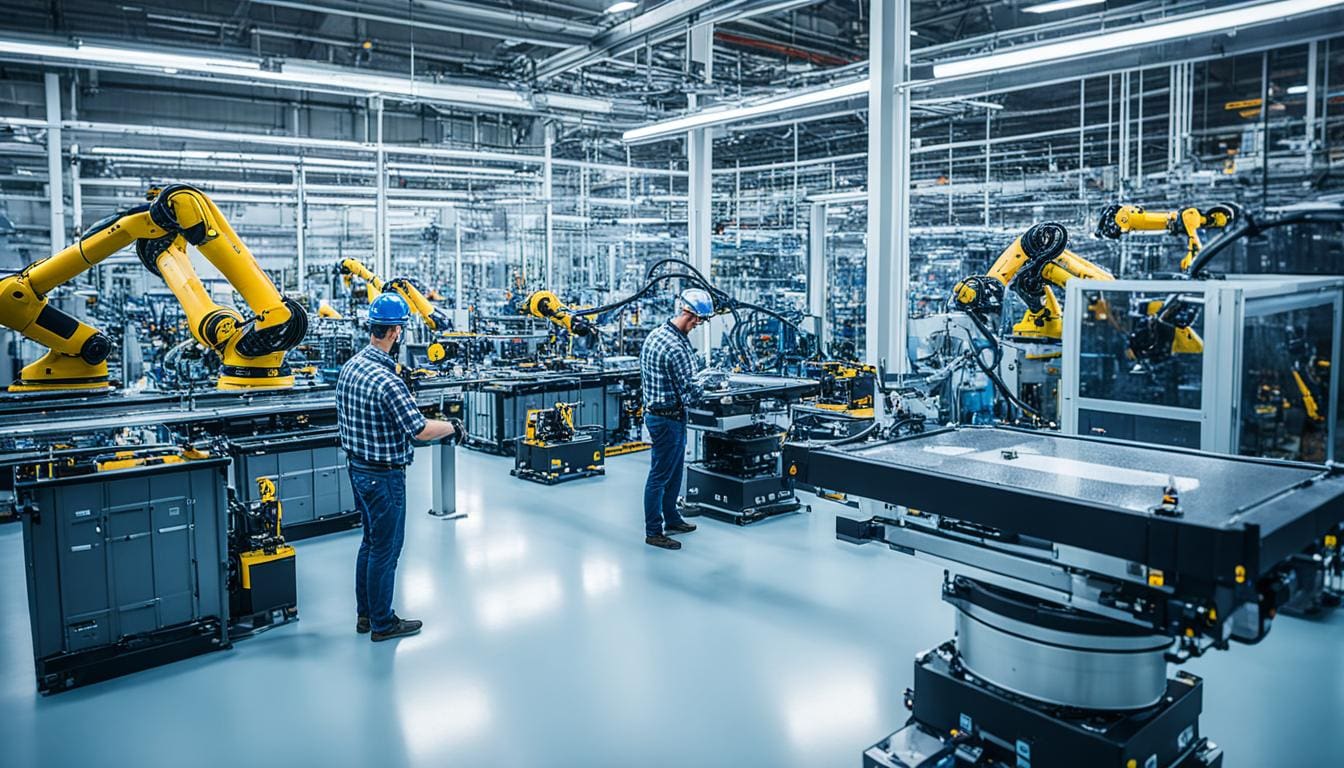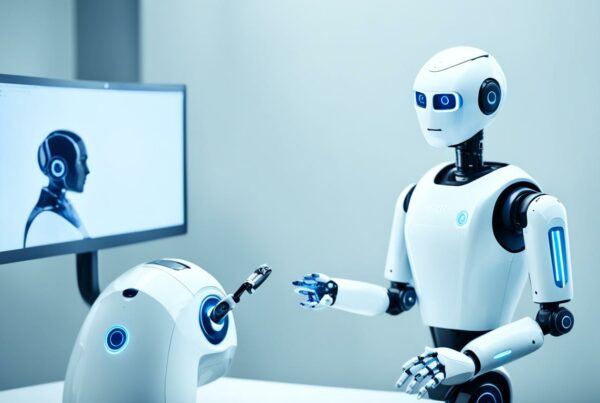Revolutionising Sectors: How AI is Transforming Industries
In an era where technology is not just an accessory but the very fabric that binds our society, there’s one phenomenon silently orchestrating a monumental shift across industries: artificial intelligence (AI). From redesigning manufacturing floors to managing financial portfolios, AI is not just infiltrating but revolutionising countless sectors. But as we stand on the cusp of what many deem the future of industries with AI, one must ponder, are we prepared for the AI-driven changes poised to reshape our world?
Witness the unfolding narrative as we delve deep into the sectors transformed by AI’s touch. The efficiency of economic giants, bolstered by the seemingly sentient force of machine learning and data analytics, reveals a new reality—a world where every operational element is synchronized by the revolution of AI in various sectors. The ramifications are vast and, quite possibly, the foundation of a new industrial epoch.
Key Takeaways
- Understanding the pervasive impact of AI across multiple sectors and its role in driving forward the future of industries.
- Insights into how AI is revising traditional business processes, fostering innovation, and reshaping decision-making.
- Exploration of AI’s transformative capabilities in enhancing operations, efficiency, and service delivery.
- Recognition of the broader societal, economic, and governance challenges that accompany AI integration.
- A glimpse into the potential of AI as a catalyst for economic development and a harbinger of progressive change.
The Transformational Impact of Artificial Intelligence in Manufacturing
The advent of Artificial Intelligence (AI) in manufacturing paves the way for an era of innovation and efficiency, reshaping the landscape of an industry that’s at the heart of global economies. By integrating AI, the manufacturing sector is witnessing significant improvements in various facets of operation, from predictive maintenance to quality control, ultimately nurturing a more robust and dynamic economy.
Predictive Maintenance and Operational Efficiency
One of the most immediate benefits of AI within manufacturing is predictive maintenance. By analysing data and anticipating potential machine breakdowns, AI provides manufacturers a valuable edge in operational efficiency. Such foresight minimises costly downtimes and extends the longevity of vital machinery, signifying a transformative step in the manufacturing domain.
Advancements in Quality Control with AI
Quality control is another area greatly benefiting from AI’s capabilities. Incorporating advanced computer vision systems, AI significantly enhances defect detection on production lines, ensuring products meet the highest standards demanded by today’s markets. The precision in identifying nuances that human eyes may miss marks a new benchmark in quality assurance.
Optimising Production through AI-Driven Scheduling
The utilisation of AI extends to the realm of production scheduling, where algorithms are fashioned to produce optimised timetables. This ensures not only that resources are allocated effectively, but also that customer demands are met punctually, showcasing AI’s role in attaining process optimisation.
Enhancing Product Design Using AI’s Analytical Capabilities
The influence of AI in manufacturing also extends to product design and development. AI’s capacity to simulate and analyse design prototypes helps in identifying and rectifying potential issues at an early stage, saving both time and resources in the product lifecycle. This innovation heralds a new modus operandi in the sector, charting a novel approach to manufacturing excellence and creativity.
As AI continues to propel the manufacturing industry forward, the role of collaborative robots and AI-driven inventory management systems bear testimony to the technology’s potential in enhancing productivity and revolutionising long-standing practices. The fusion of human dexterity with AI’s precision is igniting a new chapter in industrialisation, proving that AI’s influence on industries is not just transformative but also indispensable for future economic growth.
The Role of AI in Future-Proofing the Finance Industry
The finance industry is embracing a groundbreaking shift as artificial intelligence in business transforms operations, augments services, and pioneers new frontiers in financial management. The introduction of financial AI is paving the path towards a more secure, efficient, and forward-thinking sector.
One of the most remarkable contributions of AI to finance is the advent of robo-advisers. These sophisticated algorithms have democratised financial advice, making portfolio management services accessible to a broader audience. Robo-advisers are not only cost-effective but also remarkably accurate, curating personalised investment strategies based on vast datasets.
AI’s influence extends to enhancing security within the financial domain by improving fraud detection. Machine learning models quickly identify and flag anomalous transactions, reducing the incidence of fraudulent activities and mitigating risks in real-time.
Further changing the landscape is AI’s role in high-frequency trading (HFT). In the HFT paradigm, AI systems make trading decisions in milliseconds, leveraging advanced computational techniques to execute numerous trades simultaneously, which increases market efficiency and liquidity.
| AI Application | Benefits | Industry Implications |
|---|---|---|
| Data Analysis & Lending Decisions | Enhanced credit risk assessment | More accurate lending, personalised loan offerings |
| Robo-Advisory Services | Democratisation of investment advice | Broader market participation, tailored investment solutions |
| Fraud Detection Systems | Early detection of anomalous activities | Reduced risk, increased trust in financial transactions |
| High-Frequency Trading | Faster trade execution, increased liquidity | More dynamic and efficient financial markets |
As storage and processing capabilities expand, the AI impact on industries, particularly finance, signifies an era of unprecedented growth and innovation. Investment in AI technologies by financial institutions showcases their resolve to remain resilient in the face of change, adapt to the ever-evolving market demands, and future-proof their operations.
AI is not only reshaping the way financial services operate but is also redefining the customer experience—streamlining processes and delivering services that are tailored to individual preferences and behaviours. What awaits is a paradigm where artificial intelligence in business not only revolutionises the inner workings of the finance industry but also seamlessly integrates with the daily lives of consumers.
“The finance sector’s investment in AI reflects a deep commitment to harnessing technology for precision, efficiency, and smarts; it’s a strategic move to stay ahead of the curve.”
Revolutionising Healthcare with AI: Improving Diagnostics and Patient Care
The advent of AI in healthcare is setting a precedent in the way medical professionals approach disease detection and patient care. By inherently transforming healthcare with AI, the sector is witnessing revolutionary advancements in personalised patient care and AI-driven diagnostics. These ground-breaking applications not only enhance the precision of medical assessments but also introduce a novel paradigm of support to healthcare staff, ensuring efficiency in the face of escalating demands.
AI’s profound impact on personalised patient care is demarcated by its aptitude to customise treatments, thereby fostering better health outcomes. The incorporation of AI-driven diagnostics into medical practice reveals an unprecedented ability to discern health conditions quickly and with a higher accuracy than previously possible. This approach helps doctors make informed decisions, ultimately improving recovery times and reducing hospital stays.
“AI in healthcare is not just a technological upgrade, it’s a vital ally for medical professionals to cater to the ever-growing needs of patient management with aptitude and humanity.”
A steadfast example of AI’s efficacy is found in imaging diagnostics, where machine learning algorithms interpret X-rays and MRI scans to identify anomalies that signify diseases such as cancer at a much earlier stage. Below is a comparative analysis of traditional diagnostics versus AI-driven methods:
| Diagnostic Method | Speed | Accuracy | Cost-Efficiency | Usability in Remote Areas |
|---|---|---|---|---|
| Traditional Diagnostics | Variable | Dependent on individual expertise | High due to manual labour | Limited |
| AI-Driven Diagnostics | Fast | Consistently high | Reduced over time with automation | Highly feasible |
It is clear that by implementing AI technologies, not only are diagnostics being refined, but so too is the entire ecosystem of patient management and treatment protocols. This symbiosis between healthcare professionals and AI is pivotal in crafting a more resilient and responsive healthcare system.
In summary, as transforming healthcare with AI continues to evolve, it behooves the medical community to embrace these changes. AI in healthcare is not just a fleeting trend but a robust impetus towards better, faster, and more personalised patient care—heralding a new era of medical excellence.
Artificial Intelligence: The New Shop Floor Assistant in Retail
The retail landscape is undergoing immense transformation, spearheaded by the infusion of artificial intelligence. Innovation-driven outlets are keenly adopting AI technologies, forging new pathways to consumer satisfaction and operational excellence. From the enhancement of customer engagement through personalised shopping experiences to the precision of AI-driven inventory management, the scope and scale of AI’s impact are vast in the retail sector.
Personalised Shopping Experiences Powered by AI
The concept of personalisation in shopping has taken a quantum leap forward thanks to AI’s capacity to sift through copious amounts of data, understanding and predicting consumer preferences with a finesse that was hitherto unachievable. Retailers are deploying AI not just as a tool but as a silent sales force, smartly nudging consumers towards products that resonate with their tastes and past behaviour.

Recognisable brands like Amazon and ASOS have been at the forefront employing algorithms that suggest items based on browsing history and purchases, while AI interfaces enable a dialogue with the consumer that guides to bespoke selections. The objective is clear: to create a shopping experience so aligned with the individual’s desires that it elevates customer loyalty and sales.
Inventory Management and Demand Forecasting
AI-driven inventory management systems are revolutionising how retailers maintain and control their stock. By accurately predicting product demand, these intelligent systems inform stockpiling strategies and pricing tactics, ensuring shelves are stocked with the right products at the right times, hence drastically cutting down on the cost of inventory surpluses or the pitfall of out-of-stock scenarios.
Moreover, the supreme analytical abilities of AI provide a granular view of inventory turnover. Retail giants like Walmart and Tesco increasingly depend on AI to draw insights from their sales data, thus aligning their supply chain operations with real-world demand. This not only contributes to an enhanced customer experience, one where products are available when needed, but also streamlines operations and reduces waste.
Transforming Mobility: AI’s Role in the Transportation Renaissance
As the dawn of a transportation renaissance emerges, the power of AI in transportation is becoming ever more apparent. Autonomous vehicles and sophisticated traffic management systems symbolise a significant leap towards a future where travel is not just about reaching a destination but doing so in the smartest way possible.
Enhancing Safety and Efficiency with Autonomous Vehicles
The incorporation of AI into the realm of autonomous vehicles promises a marked improvement in road safety and efficiency. These self-driving marvels are outfitted with state-of-the-art AI systems that analyse and respond to dynamic road conditions, reducing the rate of traffic mishaps and reshaping our transportation landscape.
Streamlining Traffic Management and Urban Transport
In bustling urban centres, AI-driven traffic management systems are indispensable in decongesting roads and enhancing the commuter experience. By intelligently controlling traffic signals and optimising transit routes, AI is instrumental in creating fluid urban movement and sustainable city living.
| Feature | Impact on Transportation | Examples |
|---|---|---|
| Real-time Data Analysis | Reduces traffic congestions and anticipates transit demands | Traffic prediction tools, Dynamic route optimisation software |
| Autonomous Vehicle Sensors | Enhances road safety by identifying and reacting to hazards | Lidar, Radar, Cameras in self-driving cars |
| AI-Optimised Traffic Signals | Minimises wait times and lowers emissions from idling vehicles | Smart traffic lights in urban intersections |
| Machine Learning Algorithms | Improves public transport schedules and resource allocation | AI-based forecasting models for bus and train services |
The integration of autonomous vehicles within the transportation network is complemented by AI’s strategic capabilities in traffic management, signifying a holistic approach to modern transport solutions. This synergy is paving the way for a revolutionary shift, driven by efficiency, sustainability, and an overarching aim to enhance the quality of urban living.
National Defence: Securing Borders with AI-Powered Strategies
In an era where security challenges are increasingly complex and pervasive, AI in national security plays a pivotal role in safeguarding nations around the globe. The integration of AI for defence strategy not merely augments the capabilities of existing systems but heralds the advent of sophisticated technologies vital for modern warfare and border security.
With the onset of national defence AI, defence organizations have access to innovative tools for processing copious amounts of data, yielding insights that drive strategic decisions and resource allocation. These AI-infused systems are adept at sifting through data to detect and analyse potential threats, providing a significant edge in pre-emptive security initiatives.

| AI Application | Impact on Defence | Potential Outcomes |
|---|---|---|
| Threat Detection | Enhanced analysis of intelligence leads to early identification of security threats. | Reduction in response times and proactive threat management. |
| Logistics Optimisation | AI algorithms streamline supply chain management and maintain inventory levels. | Improved efficiency and reduced costs in military operations. |
| Autonomous Systems | Deployment of unmanned vehicles and surveillance drones for reconnaissance. | Extended reach and enhanced safety for defence personnel. |
| Cyber Defence | Real-time monitoring and automated countermeasures against cyber threats. | Strengthened cybersecurity infrastructure. |
The real-time analytics and decision-making prowess offered by AI are instrumental in the development and execution of nuanced defence protocols. As AI continues to evolve, it promises to reshape the landscape of national security, fostering a new era of fortified borders and enhanced military readiness.
The transformative potential of AI in the realm of defence strategies is undeniable, setting the stage for a future where borders are not only monitored but intelligently fortified.
Artificial Intelligence and Its Influence on Sustainable Agriculture
In an era where sustainability has become a clarion call, artificial intelligence (AI) is playing a pivotal role in transforming agricultural practices. By integrating precision farming and predictive analytics, AI is not only enhancing the efficiency of food production but also nurturing the principles of sustainability within the agricultural domain.
Precision Farming: Maximising Crop Yields with Data Analytics
Precision farming stands out as one of the most impactful applications of AI within agriculture. It employs a range of AI-driven technology to collect and analyse data, ensuring that crops receive exactly what they need for optimal growth. This approach reduces waste, improves crop yields, and preserves vital resources.
Predictive Analytics in Livestock Management
Similarly, in livestock management, AI’s predictive analytics is reshaping traditional approaches. Farmers now utilise sophisticated algorithms to anticipate and address the health needs of their animals. These systems provide early warnings of potential issues, optimise breeding periods, and manage dietary regimes, leading to healthier livestock and better yield.
| Technology | Application in Agriculture | Benefits |
|---|---|---|
| Machine Learning | Plant disease identification | Early detection and targeted treatment |
| IoT Sensors | Soil and crop monitoring | Real-time data for informed decision-making |
| Drone Technology | Precision crop spraying | Reduced chemical usage and increased efficiency |
| GPS Mapping | Field mapping and analysis | Resource optimisation and yield maximisation |
| Data Analytics | Weather prediction and risk assessment | Seasonal planning and risk mitigation |
The integration of AI into sustainable agriculture signals a new horizon where efficiency and environmental stewardship go hand in hand. As AI’s impact on sustainable agriculture continues to expand, the fusion of ancient agronomy with futuristic technology heralds a greener, more abundant future.
AI’s Growing Presence in Education: Personalising Learning Paths
The integration of AI-driven education is initiating a paradigm shift within the sector—enabling personalised learning experiences that cater to the varied paces and preferences of students. Educational institutions are progressively tapping into the potential of AI in education to create a more nuanced and responsive approach to pedagogy.
At the heart of this transformation is the ability of AI to meticulously analyse each learner’s interaction patterns and performance, subsequently tailoring the content and methodology to suit their individual needs. This level of customisation is redefining the educational journey as a more engaging and efficient one, with technologies that adapt in real-time to the evolving challenges faced by learners.
Moreover, the implications for inclusivity are significant. Students with diverse learning requirements, who once may have been left behind in the traditional education models, now find that the AI-assisted frameworks empower them with tools and resources aptly harmonised to their specific learning necessities.
- AI tools provide adaptive learning features that adjust the difficulty level of tasks in accordance with student performance.
- Intelligent tutoring systems can offer immediate feedback, enabling students to learn from mistakes in real-time.
- Data-driven insights empower educators to identify gaps in learning and address them proactively.
Through the lens of personalised learning, AI is not only enhancing educational engagement but is also laying down the foundation for a future where every student can achieve their full potential, supported by an intelligent, responsive, and dynamic education system.
Smart Energy Solutions: AI’s Role in a Sustainable Future
As nations commit to a greener future, it’s the evolution of artificial intelligence (AI) in energy systems that’s inspiring a vision of sustainability and efficiency. AI’s role in energy has become a cornerstone in the development of smart grid management, ensuring that renewable energy systems can integrate seamlessly into our existing infrastructure. The implementation of sustainable AI energy solutions promises an eco-friendly paradigm shift towards more resilient and adaptable energy networks.
AI in Renewable Energy: Optimising Grid Management
AI-driven smart grid management stands at the forefront of renewable energy innovation. It’s not just about producing energy sustainably; it’s about distributing it smartly. Utilising algorithms and predictive analysis, AI examines weather predictions, consumer demand patterns, and the fluctuating supply of renewables to make real-time decisions that balance grids effectively and prevent energy wastage.
Revolutionising Energy Consumption with Smart AI Technologies
In both the residential and industrial realms, smart AI technologies are paramount in optimising energy use. By monitoring consumption patterns and adjusting to peak demand times, AI ensures energy is deployed efficiently. This not only results in significant cost savings for consumers but also supports global efforts to reduce carbon footprints, paving the way towards achieving ambitious climate targets.
Ultimately, the introduction of AI into renewable energy and smart grid management is not just revolutionising the sector; it’s laying the foundation for a sustainable legacy that will power generations to come in harmony with our planet.
How AI is Transforming Industries: Business Processes Reimagined
The transformational impact of artificial intelligence is an undeniable force reshaping the industrial landscape. As organisations strive for efficacy and innovation, the utilisation of AI in streamlining operations and fostering intelligent decision-making is becoming increasingly prevalent. This evolution in business methodology not only amplifies productivity but also engenders an environment where strategic planning is infused with data-driven insights.
In the spirit of progress, let’s delve into how automating administrative tasks with AI and leveraging AI for strategic decision-making are setting new benchmarks in the corporate world.
Automating Administrative Tasks for Efficiency Gains
Mundane tasks that once consumed copious amounts of time are now being reassigned to intelligent systems capable of executing these functions with unmatched precision. From scheduling to data entry, AI is rapidly removing the manual burden, freeing human talent to pursue more strategic and innovative pursuits.
| Administrative Task | Pre-AI Process | AI-Enhanced Process | Efficiency Gains |
|---|---|---|---|
| Data Entry | Manual entry, prone to errors | Automated input, validation and correction | Reduction in errors, time-saving |
| Scheduling | Manual coordination, higher risk of conflicts | AI-powered scheduling optimisation | Improved resource utilisation |
| Report Generation | Labour-intensive, time-consuming | Instantaneous, data-driven reporting | Real-time insights, faster decision-making |
| Customer Service | Primarily human-dependent interaction | Chatbots and AI customer assistance | 24/7 service, enhanced user experience |
Leveraging AI for Strategic Business Decision-Making
AI does not merely transform the quotidian; it redefines the very essence of strategic projection. By implementing AI in strategic decision-making, organisations gain predictive prowess that supports preemptive business maneuvers. Intuitive visualisations of market trends and the ability to model hypothetical scenarios enable leaders to navigate the complexities of today’s economic environment with confidence.
- Algorithmic market analysis efficiently guides investment decisions.
- AI-influenced supply chain management predicts and reacts to shifting consumer demands.
- Customer relationship management systems, powered by AI, personalise interactions, driving loyalty and revenue.
By coalescing traditional industrial practices with the cutting-edge capabilities of AI, the corporate sector stands on the cusp of a new era characterised by exponential growth, dynamism, and an agile response to market stimulants.
Conclusion
The inexorable rise of artificial intelligence is reshaping the face of numerous industries, underlining the undeniable role of AI in industry transformation. We are witnesses to an era where the integration of AI has become a cornerstone for innovation. It is not merely about automation; it’s the heightened capabilities of AI to analyse, predict, and evolve that are driving this wave of change. The revolution of AI in various sectors is evident as we observe its infiltration into everything from manufacturing lines to financial markets, and from healthcare diagnostics to precision farming.
This AI-driven industry transformation heralds significant strides in efficiency and economic development. Yet, as we embrace these progressive changes, industries must give due consideration to the broader impact of this digital metamorphosis. Ethical considerations, regulatory frameworks, and societal impacts necessitate vigilant attention to ensure that the deployment of AI technologies aligns with the fundamental human values and collective welfare. As the potential of AI unfolds, the approach must be conscientious, ensuring that its immeasurable capabilities serve to augment human effort rather than replace it.
In summation, the transformation AI bestows upon industries is nothing short of remarkable, propelling a renaissance of innovation and strategic advancement. However, the true measure of success will hinge on our ability to steer this technology in a direction that benefits society as a whole. Fostering a symbiotic relationship between AI’s advancements and human expertise will be the defining challenge of our generation. It holds the promise of not only revolutionising the way industries operate but also ensuring that the future we build is inclusive, sustainable, and reflective of our shared human values.
FAQ
How is AI revolutionizing the manufacturing sector?
AI is revolutionizing manufacturing through predictive maintenance that forecasts equipment failures, advanced quality control using computer vision systems, AI-driven scheduling for optimized production and resource utilization, and enhancing product design with simulation and analysis for early issue detection.
What changes are AI bringing to the finance industry?
AI is introducing changes such as refined data analysis for lending decisions, robo-advisers for personalized investment portfolios, enhanced fraud detection systems, and high-frequency trading, which are all contributing to economic growth and reshaping investment strategies.
In what ways is AI transforming healthcare?
AI is revolutionizing healthcare by providing precision in disease detection, treatment customization, and patient management. This includes virtual health assistants and advanced diagnostic tools that improve the speed and accuracy of condition identification, thus raising the quality of care and assisting with the healthcare workload.
How is AI influencing the retail sector?
In retail, AI creates personalized shopping experiences by analyzing individual shopping habits, which dramatically enhances consumer relations. It also improves inventory management and demand forecasting, leading to optimised stock levels and reduced risks associated with inventory mismanagement.
What role is AI playing in the transformation of the transportation industry?
AI plays a pivotal role in transportation by enabling the development of autonomous vehicles, which promise to improve road safety and traffic efficiency. These vehicles use AI to process real-time data for immediate decision-making. AI is also used in traffic management and urban transport to minimise congestion and facilitate seamless commuting.
How is AI impacting national security?
AI impacts national security by providing improved capabilities for data analysis and strategic planning, which enhances understanding of threats and decision-making processes. AI-driven systems offer real-time insights that are critical for formulating and implementing national defence strategies.
How is AI utilized in modern agriculture?
AI is transforming agriculture through precision farming and data analytics that maximise crop yields and resource use. It also propels predictive analytics for improved livestock management, monitoring animal health, forecasting production levels, and enhancing overall farm efficiency, leading to more sustainable agricultural practices.
What is AI’s role in education?
AI is redefining education by supporting personalized learning environments tailored to individual students’ needs. AI educational tools adapt to learning styles and paces, offering engaging and efficient learning experiences that hint at the transformative potential of AI in education.
How does AI contribute to sustainable energy management?
AI aids sustainable energy management by optimizing grid systems, especially crucial for renewable energy sources where supply and demand need careful balancing. Smart AI technologies also help manage energy consumption in domestic and industrial settings, which contributes to global carbon footprint reduction efforts.
What impact does AI have on business processes across industries?
AI significantly impacts business processes by automating routine administrative tasks, which frees human workers for more creative roles. It also provides strategic insights through predictive models and data-driven analytics, which help businesses remain competitive.
Source Links
- https://www.linkedin.com/pulse/revolutionizing-industries-impact-intelligent-ronald-van-loon-kj0fe
- https://www.assuredpartners.com/blogs/manufacturing/2023/revolutionizing-manufacturing-how-ai-is-transforming-the-industry/
- https://www.brookings.edu/articles/how-artificial-intelligence-is-transforming-the-world/
Internet Creation Ltd. specialises in Web Design & Development, Graphics Design and Digital Marketing (SEO & PPC). For more information on how we can help your business, email [email protected].





